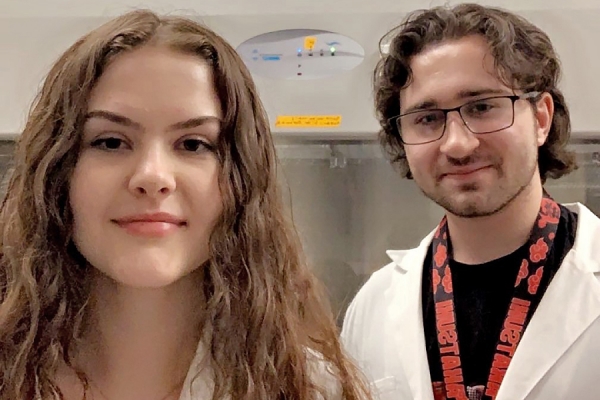 Kylie Slogan and Alex Agostinis were selected as one of the top 40 teams to present at the IgNITE Medical Case Competition.
Kylie Slogan and Alex Agostinis were selected as one of the top 40 teams to present at the IgNITE Medical Case Competition.
Kylie Slogan and Alex Agostinis, second-year students in professor Yufeng Tong’s protein biochemistry lab, were selected as one of the top 40 teams of more than 200 from across North America to present at the IgNITE Medical Case Competition. This marks the first time a UWindsor undergraduate team participated in this competition and made it into the final round.
The competition invites students to submit their proposals beginning with an abstract and elevator pitch video. Slogan and Agostinis progressed to the final round and presented a video of their novel research proposal to experts in the field. They were both drawn to seeing how eyes from the chemistry and biological fields offer different interpretations.
“Cardio Respiratory Diseases” was the theme for this year. After reading recent articles and studies related to the topic, the UWindsor team decided to focus on allergic asthma, as current treatment options are not satisfactory. Bronchodilators lead to buildup of scar tissue, and corticosteroids have concerning side effects.
Their experience in the lab with ubiquitin, a regulatory protein, led them to focus on two types of T cells regulated by ubiquitin in their project: the T helper cells that elicit an immune response, and T regulatory cells that dial back the immune response.
“We left with a million more questions that we can’t wait to answer,” Agostinis said. They learned how to construct a proposal, write an abstract, and make clear the relevance of their proposed research, stepping stones to carrying out cutting-edge research and writing their own grant applications in the future.
Agostinis was a mixed martial arts fighter who suffered nerve damage. Bedridden, he read scientific literature looking for his options, which were limited. A paper of Dr. Tong’s caught his eye, and he became drawn to the field of research. Later, he attended a “meet the professors night” through the Outstanding Scholars program with the intention of meeting Tong.
Slogan’s interest in this field came about for an entirely different reason. A co-worker who volunteered in Tong’s lab ignited her interest in a research career.
Tong says he takes pride in their work and the success they enjoyed in the medical case study.
“This competition is an excellent opportunity for undergraduate students to learn and understand how research ideas are formulated and how experiments are designed and implemented,” he said. “Science serves as the driving force behind all the technological advancement in the world, and I hope to see an increasing number of UWindsor students express their interest in pursuing highly rewarding scientific careers.”
The team’s abstract will soon be published in the Undergraduate Research in Natural and Clinical Science and Technology with the 40 other teams that presented at the conference. Their video presentation is listed on the IgNITE website and hosted on YouTube.
—Lynn McLaughlin
